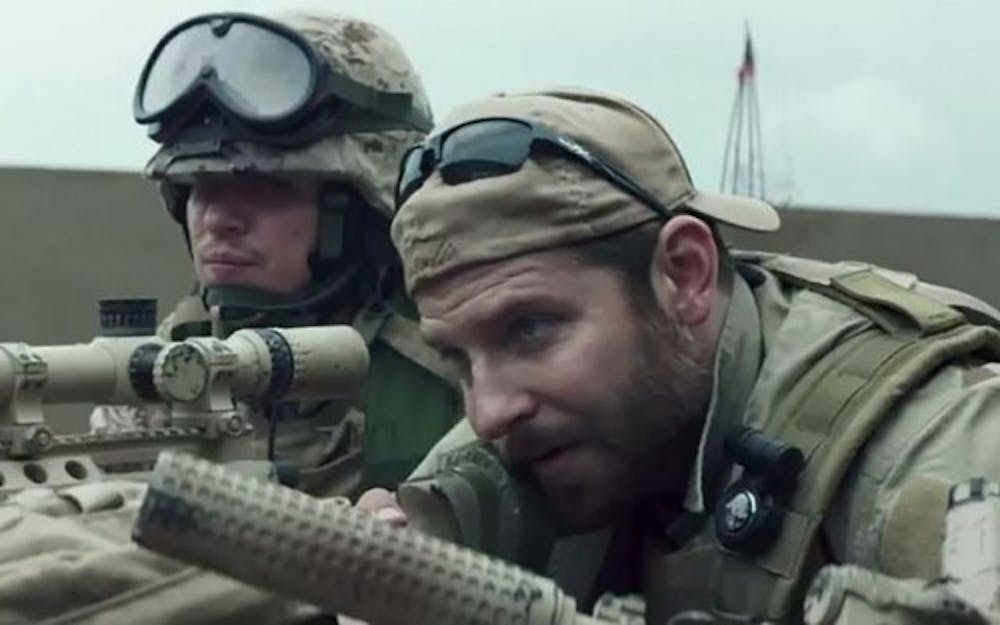Film: American Sniper
Release date: Jan. 16
Studio: Village Roadshow Pictures
Grade: A
The film opens with a sniper laying on a roof, surveying his fellow soldiers on the ground for danger. Suddenly, a woman and her child start to approach the group of U.S. soldiers on the ground. The child appears to be holding a grenade.
The sniper is faced with a split-second decision: End the life of a young child and his mother or potentially jeopardize his squad mates below.
He makes the “right” decision and protects his flock.
The opening scene is a microcosm of the incredible life or death decisions the sniper must make every day at war.
The sniper in Clint Eastwood’s latest directorial effort is Chris Kyle, played by Bradley Cooper (Serena), who is the most lethal sniper in American military history.
American Sniper was released in the United States on Jan. 16. Since then, the movie could be considered the modern American war movie, a film that asks the incredibly ambiguous, moral and emotional questions that war movies often fail to address.
The movie is based on the real events described in Kyle’s autobiography, “American Sniper: The Autobiography of the Most Lethal American Sniper in U.S. Military History.”
Kyle is characterized in the film as a man of strong moral fortitude.
In a flashback to his childhood, viewers see Kyle’s father explain that there are three different types of people in the world: sheep, wolves and sheepdogs.
Sheep represent the general populace, while the wolves and sheepdogs are those who either manipulate or protect the sheep, respectively.
True to his upstanding morals, Kyle is a sheepdog – a protector of the weak from the whims of the wicked.
His innate sense of personal responsibility paired with his natural marksmanship made his military career a logical and inevitable path for Kyle to forge – especially after 9/11.
While his prowess in Iraq gained him notoriety, the real war Kyle wages occurs at home between tours.
After a short courtship with his wife Taya (Sienna Miller, Foxcatcher), audience members immediately see the effects the war has on their marriage.
Kyle feels responsible for his family but at the same time, any time spent away from Iraq makes him feel like a coward. He feels every moment spent away from the war is another soldier he could’ve saved.
Taya’s pleas for him to not return to combat convey a strong feeling of ironic desperation: his steadfast loyalty is why she loves him, but simultaneously becomes the wedge that drives them further apart.
It takes four tours before Kyle realizes his importance to his family and starts to fight the war at home by helping rehabilitate injured veterans.
The bulk of praise for American Sniper should be heaped on the shoulders of its star Bradley Cooper. Although a much less showy role than his last two Oscar runs, Silver Linings Playbook and American Hustle, Cooper’s silent, strong presence in American Sniper highlights the intense moral questions the film raises.
What is “right” in war? Is killing a child ever justified? What’s more important, family or patriotism?
These are the questions Kyle is torn between.
Cooper’s portrayal of Kyle fills the quiet moments at home with a rage that boils underneath and gives the battle sequences a level of sensitivity and caring that are waiting to explode at the surface.
Kyle is on a plane all his own – these are his burdens to bear, and the audience can feel his rage and confusion underneath his larger-than-life persona.
Eastwood’s directing might not break any new ground with American Sniper, but his films have always concerned themselves with how violence affects the American man, and this film is no exception. But when an auteur as legendary as he is performing his craft at such a high level, who can complain? Despite claims about its historical inaccuracies, American Sniper is Eastwood’s finest offering in nearly a decade.
The actions scenes are tense and claustrophobic; there is no room for anything outside of the danger Kyle faces on a daily basis. The director’s admiration for the film’s main character pours out in the credits sequence where rows of admirers show their love and appreciation of Kyle’s service.
Once again Eastwood has created the most iconic of all movie characters: an American hero. With American Sniper Eastwood has taken this once step further, portraying the difficult decisions and moral questions many war films fail to address.
email: arts@ubspectrum.com





